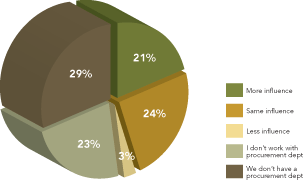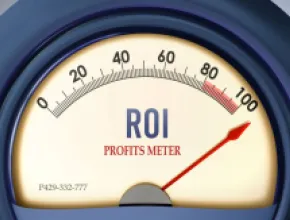As the meeting planning profession continues to evolve, so do its strategic responsibilities. More and more, corporate meeting planners are taking a front-row seat in management meetings, projecting their voices when core decisions are at stake.
Industry organizations continue to help planners along as well. MPI’s Global Corporate Circle of Excellence, for example, studies strategic meetings management and continues to release white papers on the development of such programs.
Yet, the experiences of all meeting planners are not the same. To gain some insight into what planners are experiencing in their own organizations, Meetings Media, publisher of Meetings South, conducted a nationwide survey of nearly 400 corporate meeting planners and conducted follow-up interviews with some of the participants.
Do you feel meeting planning has become more strategic in recent years?

Lisa Burkett, CMP, manager, member services and events for The Leadership Institute, San Francisco: I feel that it has. I’ve taken more of a strategic focus than just limiting myself to logistics.
For the past two years, my logistical responsibilities haven’t diminished but I have added on more strategic responsibilities as well. I look at the agendas for our meetings and make sure we have the correct balance to address the needs of our members.
Cynthia Bullock, CMP, management, event planning, Integrated Solutions and Services, Knoxville, Tenn.: I think meeting planning has become a much more strategic role, especially within the last five to eight years, because companies are more budget oriented.
Our job is moving away from just organizing coffee breaks with attendees to here is a person who can negotiate contracts with vendors. It is almost like we have to be lawyers on the side to make sure we are protecting ourselves and our clients.
I’ve also seen a big increase in the clauses, phrases and addendums on the hotel side and clauses and addendums of our own. The hotel used to present you with a contract and you just signed it. Now you have to understand exactly what you are signing, whether it is for your company or your client’s company.
Becky Inks, director of corporate events and travel, GENCO, Pittsburgh: Definitely. Probably for the first eight of my 11 years here, meeting planning was a side job. But more and more over the last couple of years, as our meetings have grown, so has the need for someone to take charge from beginning to end.
Angela G. Jones, corporate meeting planner, 3 Mark Financial, Sugarland, Texas: No. We do our annual conference in April of each year. We have about 150-200 people, but it is not vital to our company’s success.
Amy Thomas, department administrator II, Baker Hughes Inc., Houston: Absolutely. I’ve been planning meetings and events since I got here in 2001, and for the past two years I’ve become looked upon for my opinion, my input, and what I say goes.
I get to plan everything from start to finish and everything in between.
Jennie M. Campbell, CMP, CMM, PMP, CEO/president, Meet Your Market, New Orleans: Absolutely. If you are going to survive and if you are going to get into a truly senior management role, you have to become more strategic.
To get more strategic, I went to the project management side and learned value analysis.
Everything is related to a number and a measurement. Companies are more and more sensitive about cutting back on their spending, and if they do spend, they need to know they are getting a return. You have to be able to show where a certain meeting has influenced the sale of a new product, for example.
It is not just producing the meeting anymore; it is taking it a step beyond. [You have to think] how the meeting impacts the company now and in the future. It is about going up to the next level and learning to be a visionary, then taking that vision and making it into measurable components.
As a meeting planner, you are coming up with the type of event that will meet the goals and objectives that are set. Once you have a vision, it is about being able to put together a measurable plan. You are showing that investing into that visionary concept does have a return, whether it is negative or positive.
A company will never be able to grow without being able to try, and meeting planning can be a strategic part of that. Understanding how your meetings fit into the company’s strategic plan is important.
Have you taken more of a strategic role in your company?

Burkett: When we meet as a team, I review draft agendas in advance. I look at them for appropriateness. I also read evaluations carefully and look at trends in member evaluations.
I also look at comments by outliers. If 90 percent were very satisfied, I will call up the 10 percent who weren’t and see what we can do better in the future.
Campbell: I can only relate it to my personal life and career, but getting my CMM and CMP brought me up to that next level. It made me grow professionally.
What helped me personally was not to pigeon-hole myself as just a meeting planner, but to figure out how I truly fit into the business model.
Meeting planning is a component of marketing. It is not all marketing, but in the business world, meeting planning falls underneath marketing.
And in my opinion, if you want to move up, you have to think beyond just the meeting. You have to think of marketing as a whole.
Inks: Working so closely with the CEO has made a tremendous difference. It has made it easier because he has seen first-hand the results since this position has been implemented.
Compared with two to three years ago, does your procurement department have more influence in your purchasing decisions? What are you seeing in the industry relating to this?

Campbell: In corporations, I am definitely seeing an increase in procurement departments working with meeting planners. More and more companies are lumping them together.
This poses some difficulties because you have two different perspectives. First of all, you have meeting planners who are always looking at the relationship they have with vendors. Then you have procurement, who deals with the numbers.
When it comes to a meeting, I think it needs to be left in the hands of the meeting planners.
A lot of times when procurement starts getting involved, you don’t have the relationship.
Let’s say the procurement department got a deal and you booked a meeting and there is an emergency and you don’t have a relationship established. You are up a creek.
Sarbanes-Oxley has affected organizations in so many different ways. They are very careful now about how they spend their money because they are being observed. Since that has come around in the meetings industry, it has changed the meetings industry a lot and I think that is why companies have gone through the procurement route.
When I started in the industry, it wasn’t uncommon for meeting planners to go on several site inspections just to find out what was out there. Now [companies] are trying to streamline this process. They are giving a quantitative-type task to the procurement department.
Has your company been doing more outsourcing over the past two to three years? What are you seeing in the industry?

Thomas: If I need audiovisual, I outsource. But I don’t hire third-party meeting planners.
Inks: Not at all. We are 100 percent in-house.
We started out 12 to 13 years ago with an annual conference and it was done solely in-house. We’ve since downsized to smaller conferences instead of that larger one and it is working out, so there is no need to outsource it.
With outsourcing you don’t get the hands-on experience because they don’t know your customers like you do.
Campbell: I see it going on, but I see a little bit of pushback. It absolutely relates to the economy. In a down economy, everyone starts to cut back.
In the early to mid-’90s, outsourcing became really prevalent. In the late ’90s it started coming in-house again.
A lot of people are worried that if you outsource, you are losing control of your meeting. People forget that when they outsource, they are [usually] not just getting an individual, they are getting a team of people.
If you have the right communication process, it becomes a valuable resource.
Bullock: I would say that for the industry as a whole, when budgets tighten, outsourcing becomes a little more common because companies like to hire those services short-term.
I also think a lot more companies are seeing the value of a corporate meeting planner if they have a lot of meetings. It just depends.
I’ve found that if you can prove your value to the company, it is more likely to become a permanent position.
How has your meeting planning budget changed over the past two to three years?

Thomas: It hasn’t changed. A lot of times I don’t have a specific budget in mind. It depends on where my company wants their meeting to be held and what environment they are after.
Inks: In our case, our budget was higher before 9/11 happened. Then [the company] scaled back a lot, but in the past few years, they have been coming back up again.
I think things are just coming back to where they were, economy-wise. People are not as leery about spending money on conferences and events as they were before.
It always makes life easier to have a higher budget. But we’ve never had a problem adapting to whatever budget we have. We’ve always worked around it.
Dale Fisher, CMP, director of event operations, Network World, Southboro, Mass.: My budget has increased, but we have more events. Now, every line item needs to be looked at. Companies are taking more of a finer look at budgets.
Bullock: I have seen that people are more cautious as to where they spend their money. I think that budgets have increased, but that has to do with the costs of hotels and travel.
Travel has really increased and I have not seen [the number of meetings decrease].
Campbell: Overall I would say budgets are staying the same or they are decreasing in the industry. Where you get into trouble is when you have a Kmart budget with a Macy’s appetite.
Although with increased budgets, companies are demanding more and more accountability.
Jones: Our meeting planning budget has increased 25 percent over the past two years.
Our company’s line of business is doing very, very well, so because of this, we are able to spend more on our annual meeting. It has made life easier.
Burkett: It has only changed because we have added some member services. We’ve added sessions to our meetings and there is a cost in doing so.
Otherwise, it has not changed. There has been no slashing of budgets.
Have there been any changes in the staffing of your meetings department in the past two to three years?

Fisher: There are three other people in my department and we hired one other person a few years ago. So we do have more in-house staff. That is just for operations.
Campbell: I would say within the last two years I’ve seen a decrease in staff; just a little bit. I can’t say that is across the board.
I think it generally ties to a company’s local market and directly to the economy locally, nationally and globally.
Even today, some planners struggle for respect, still fighting against the ‘party planner’ stereotype. What advice can you give to help them gain more respect and become more strategic in their positions?
Burkett: I would say ask a lot of questions. When you are handed an agenda, rather than just typing it up, take a look at the agenda. Look at the content and find out why it is developed the way it is.
I am not suggesting you should question authority. But I would ask why they decided to do it this way and that way. By doing so, it gives you a better understanding of what the agenda is.
As far as being thought of as a ‘party planner’ goes, it is not going to change overnight. But I find that when I have a better understanding of why the agenda is structured the way it is, I can give advice, and I find that I am expected to.
Campbell: I think No. 1, do the very best that you can. Meeting planning is all about customer service. Yes, you have a product, but it is how you deliver that product. It is meeting the needs of the customer.
Also, make sure to continually educate yourself on the industry. What are the trends? What are the projections? What do the gurus see coming on the horizon? And understanding the economics.
Meeting planning still has that connotation that you still plan parties, and that is terrible.
You can’t necessarily change the mindset of others, but if you understand how they are thinking, you can meet them halfway. That is how you are going to grow within an organization.
Take the time to understand all components of your company from the ground up. Choose good mentors. Pick the right company.
When you can show you are a valuable component to the strategic plan of the company, you will always have a position, no matter how small of a part you have—when you can show that, that is how you grow, how you get better and how you have stability.
Thomas: The No. 1 thing for anyone who wants to advance is education and getting their CMP. It might not bring more income, but it will bring more acknowledgements. I think education is key.
If a person wants to improve her or his knowledge, network with other meeting planners and find out how things really work.
Also, make sure to show the management what you are talking about. Know what contracts mean and how to negotiate. It is very important to show your management staff that you can negotiate on your company’s behalf and get the things you want to get for your company.
Bullock: You need to think outside just your area. Talk to people in sales and marketing. Learn what the overall goals and plans of the company are. Come up with your own ideas. You have to position yourself as the person that you want them to see.
If you come out of school and you are not finding a job in meeting planning, go on the other side of the business. A few years in a hotel or catering service—that background is invaluable. You will be able to see what it looks like from the other side of the table. And when you are a meeting planner, most vendors really appreciate that you can talk their language.
Meeting planning isn’t that different than any other job. You get out of it what you put into it.
If you as a meeting planner take the time to learn about your company and learn how they are strategically placing themselves in the market, you can be part of that.
Inks: Documentation. You have to go through your history and show your ROI. If you just say, ‘We really need someone in the meeting planning position’ without something to back that up, it is not going to happen.
Over the years I have accumulated a portfolio. Showing your work on paper is important and it is all about how you present it. I think it is all in the details.
I don’t think people realize all that goes into planning a meeting large or small.
Our large meeting at the end of the year had people coming in from all over the country and just having the details covered and having the information made a tremendous difference, but I think you have to show that.
You have to say, ‘Look what would have happened had I not had this.’
What do you see as the future of corporate meeting planning?
Bullock: I think it will just get better and better. As long as companies and organizations see a meeting planner as another professional expert that they can make use of and as long as meeting planners can continue to expand their own knowledge in the field, I can’t see why this wouldn’t be a great profession moving forward.
I think meeting planning will become a more prominent role within companies in the next five years.
For all the job transferring I’ve done throughout my life (eight jobs in 15 years), I’ve never had a problem getting a job.
Daphne Meyers, CMM, managing partner, Red Barn Group, Fargo, N.D.: I see the meeting planner becoming more and more strategic in organizations. I see companies saying, ‘We are not going to take any major step before consulting with our strategic meeting planner.’
I dare to dream that there might be a chief event officer someday.
The Meetings Corporate Planners Survey 2008 is a proprietary Meetings Media online study that was distributed to 31,566 Meetings Media subscribers. As an incentive to complete the survey, respondents were offered a chance to win a $50 Visa gift card. Conducted in December 2007, the survey generated 395 complete responses.





